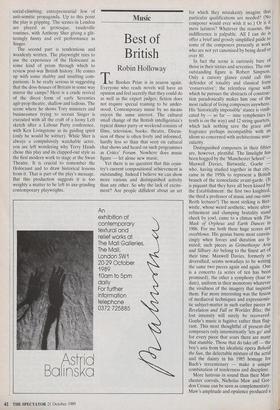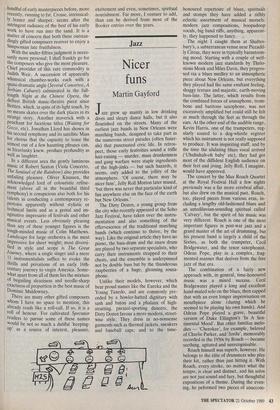Music
Best of British
Robin Holloway
The Booker Prize is in season again. Everyone who reads novels will have an opinion and feel secretly that they could do as well as the expert judges; fiction does not require special training to be under- stood. Contemporary music by no means enjoys the same interest. The cultural small change of the British intelligentsia's typical dinner party or weekend consists of films, television, books, theatre. Discus- sion of these is often lively and informed, hardly less so than that seen on cultural chat shows and heard on such programmes as Critics' Forum. Nowhere does music figure — let alone new music.
Yet there is no question that this coun- try's current compositional achievement is outstanding. Indeed I believe we can show more various and distinguished activity than any other. So why the lack of excite- ment? Are people diffident about an art
for which they mistakenly imagine that particular qualifications are needed? (No composer would ever wish it so.) Or is it mere laziness? Whatever the reasons, the indifference is palpable. All I can do Is offer a brief and grossly simplified guide to some of the composers presently at work who are not yet canonised by being dead or over 80.
In fact the scene is curiously bare of those in their sixties and seventies. The one outstanding figure is Robert Simpson. Only a cursory glance could call this defender of tonality and classical form `conservative'; the relentless rigour with which he pursues the abstracts of construc- tion paradoxically makes him one of the most radical of living composers anywhere. His 'historically impossible' stance is vindi- cated by — so far — nine symphonies (a tenth is on the way) and 12 string quartets, which lack nothing save the grace and fragrance perhaps incompatible with an idiom so concerned with architectonic mus- cularity. Distinguished composers in their fifties are, however, plentiful. The limelight has been hogged by the 'Manchester School' — Maxwell Davies, Birtwistle, Goehr — who, having studied together in that city, came in the 1950s to represent a British branch of the iconoclastic avant-garde. (It is piquant that they have all been kissed by the Establishment: the first two knighted, the third a professor of music and one-time Reith lecturer!) The most striking is Birt- wistle, whose weird aesthetic, where ultra- refinement and clumping brutality stand cheek by jowl, came to a climax with The Mask of Orpheus and Earth Dances in 1986. For me both these huge scores are overblown. His genius burns most convin- cingly when forces and duration are li- mited; such pieces as Grimethorpe Aria and Silbury Air belong to the finest art of their time. Maxwell Davies, formerly so diversified, seems nowadays to be writing the same two pieces again and again. One is a concerto (a series of ten has been promised), the other a symphony (four to date), uniform in their monotony whatever the vividness of the imagery that inspired them. Far more interesting was the fusion of mediaeval techniques and expressionis- tic subject-matter in such earlier pieces as Revelation and Fall or Worldes Bliss; the lost intensity will surely be recovered. Goehr's music is fugitive rather than flag- rant. This most thoughtful of present-day composers only intermittently 'lets go' and for every piece that soars there are many that stumble. Those that do take off the boy's aria from his idealistic opera Behold the Sun, the delectable mixture of the acrid and the dainty in his 1985 homage for Bach's tercentenary — make a unique combination of tenderness and discipline.
More lustrous in sound than their Man- chester coevals, Nicholas Maw and Gor- don Crosse can be seen as complementary. Maw's amplitude and opulence produced a handful of early masterpieces before, more recently, running to fat. Crosse, intrinsical- ly leaner and sharper, seems after the astringent radiance of the best of his early work to have run into the sand. It is a matter of concern that both these outstan- dingly gifted composers recover to enjoy a Simpsonian late fruitfulness.
With the under-fifties judgment is neces- sarily more personal; I shall frankly go for the composers who give the most pleasure. Chief provider of this rare commodity is Judith Weir. A succession of apparently whimsical chamber-works each with a quasi-dramatic angle (Several Concertos, A Serbian Cabaret) culminated in the full- length Night at the Chinese Opera, the deftest British music-theatre piece since Britten, which, in spite of its light touch, by no means skates over the dark places in its strange story. Another maverick with a Penchant for facetious titles (Waiting for Lazo, etc), Jonathan Lloyd has shown in his second symphony and its satellite Mass for chorus that the capacity to tease the utmost out of a few haunting phrases can, as Stravinsky knew, produce profundity as well as laughter. In a different area the gently luminous music of Robert Saxton (Viola Concerto, The Sentinel of the Rainbow) also provides unfailing pleasure. Oliver Knussen, the acknowledged lord of colouristic refine- ment (above all in the beautiful third symphony) is conspicious also both for his talents in conducting a contemporary re- pertoire apparently without stylistic or technical limits and as a genial and im- aginative impresario of festivals and other musical events. Less obviously pleasing than any of these younger figures is the tough-minded music of Colin Matthews. Landscape for large orchestra is the most impressive for sheer weight; most diversi- fied in style and scope is The Great Journey, where a single singer and a mere 11 instrumentalists suffice to evoke the thrills and privations of an early 16th- century journey to virgin America. Some- what apart from all of them lies the mixture of beguiling sleaziness and needle-sharp exactness of proportion in the best music of Dominic Muldowney.
There are many other gifted composers whom I have no space to mention; this already reads like a roll-call. If so, it is a roll of honour. For cultivated Spectator readers to pursue some of these names would be not so much a dutiful 'keeping- up' as a source of interest, pleasure,
excitement and even, sometimes, spiritual nourishment. Far more, I venture to add, than can be derived from most of the Booker entries over the years.



























































 Previous page
Previous page